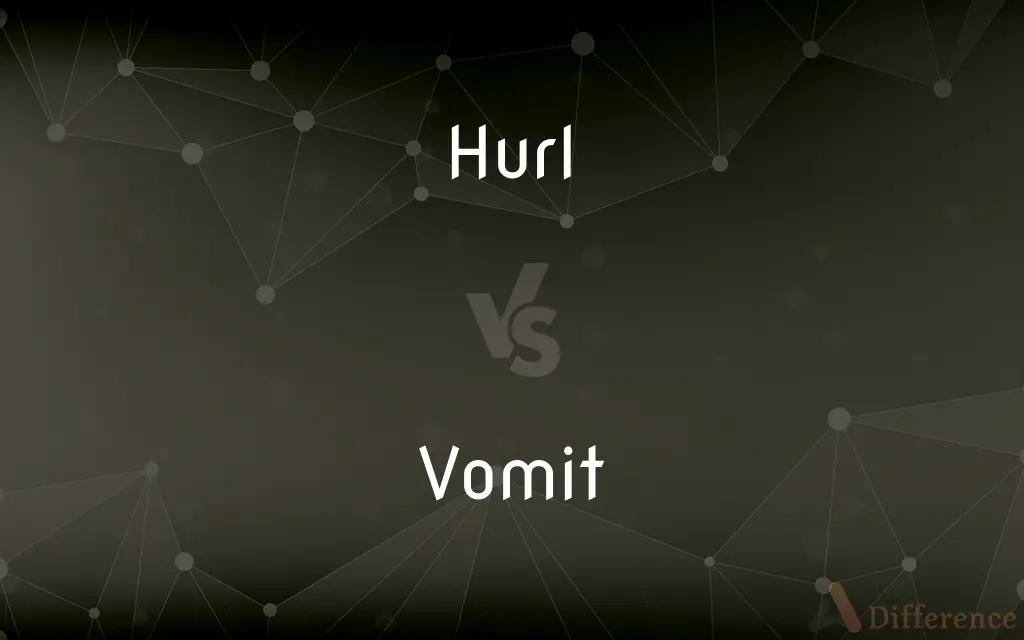Hurl vs. Vomit — What's the Difference?
By Tayyaba Rehman & Fiza Rafique — Updated on May 3, 2024
Hurl generally means to throw forcefully; vomit specifically refers to expelling stomach contents through the mouth.

Difference Between Hurl and Vomit
Table of Contents
ADVERTISEMENT
Key Differences
Hurl is a versatile verb often used to describe the action of throwing an object with great force, usually in a specific direction or at a target. On the other hand, vomit is used exclusively in a medical or biological context, describing the expulsion of the contents of the stomach through the mouth, often due to nausea.
While hurl can apply to various situations involving physical objects, vomit is specifically related to bodily functions and health. Vomiting is typically involuntary and associated with illness, discomfort, or digestive disturbances.
In everyday language, hurl might also colloquially mean to vomit, especially in phrases like "hurl one's guts out." Whereas, the term vomit remains strictly in its literal, medical sense, without any deviation into other meanings or contexts.
Hurl can be used metaphorically to describe the act of expressing something with great vehemence, such as hurling insults. On the other hand, vomit does not commonly appear in metaphorical contexts, maintaining its direct association with physical expulsion.
The severity and intention can also differ; hurling something typically implies a deliberate act, whether literal or metaphorical. In contrast, vomiting is an inherently forceful yet uncontrollable reaction of the body to internal triggers.
ADVERTISEMENT
Comparison Chart
Definition
To throw something with force
To expel stomach contents through the mouth
Usage
Can be physical or metaphorical
Primarily medical and literal
Volition
Often intentional
Involuntary
Contextual Usage
Broad (objects, insults, etc.)
Narrow (medical, health-related)
Connotation
Can be neutral or aggressive, depending on context
Generally negative, associated with sickness
Compare with Definitions
Hurl
To send or thrust rapidly.
The storm hurled debris in all directions.
Vomit
To be forcefully expelled or disgorged.
The volcano vomited lava and ash.
Hurl
To project or propel something energetically.
The catapult hurled stones at the walls.
Vomit
To eject forcefully; used especially in a figurative sense.
The overflowing river vomited its waters onto the floodplains.
Hurl
Colloquial for vomiting.
After getting off the spinning ride, he felt like he might hurl.
Vomit
To eject the contents of the stomach through the mouth.
The patient began to vomit after the meal.
Hurl
To throw something with great force.
He hurled the ball across the field.
Vomit
To expel matter from the stomach involuntarily.
Vomiting can be a sign of food poisoning.
Hurl
To utter vehemently or forcefully.
She hurled accusations at the suspect.
Vomit
Medical term for regurgitation.
Persistent vomiting requires medical attention.
Hurl
Throw or impel (someone or something) with great force
He hurled himself into the job with enthusiasm
Rioters hurled a brick through the windscreen
Vomit
Eject matter from the stomach through the mouth
She used to vomit up her food
The sickly stench made him want to vomit
Hurl
A ride in a vehicle; a lift
Hey pal, any chance of a hurl?
Vomit
Matter vomited from the stomach
The cell stank of vomit and urine
Hurl
To throw with great force; fling.
Vomit
An emetic.
Hurl
To cause to move with great force or violence
The bus's sudden stop hurled the passengers to the floor.
Vomit
To eject part or all of the contents of the stomach through the mouth, usually in a series of involuntary spasmic movements.
Hurl
To send with great vigor; thrust
Hurled the army against the enemy.
Vomit
To be discharged forcefully and abundantly; spew or gush
The dike burst, and the floodwaters vomited forth.
Hurl
To utter vehemently
Hurled insults at the speaker.
Vomit
To eject (contents of the stomach) through the mouth.
Hurl
(Slang) To vomit (the contents of the stomach).
Vomit
To eject or discharge in a gush; spew out
The volcano vomited lava and ash.
Hurl
To move with great speed, force, or violence; hurtle.
Vomit
The act or an instance of ejecting matter from the stomach through the mouth.
Hurl
To throw something with force.
Vomit
Matter ejected from the stomach through the mouth.
Hurl
(Slang) To vomit.
Vomit
An emetic.
Hurl
(Baseball) To pitch the ball.
Vomit
(intransitive) To regurgitate or eject the contents of the stomach through the mouth; puke.
Hurl
(transitive) To throw (something) with force.
Vomit
(transitive) To regurgitate and discharge (something swallowed); to spew.
Hurl
(transitive) To utter (harsh or derogatory speech), especially at its target.
The gangs hurled abuse at each other.
Vomit
To eject from any hollow place; to belch forth; to emit.
Hurl
(intransitive) To participate in the sport of hurling.
Vomit
The regurgitated former contents of a stomach; vomitus.
Hurl
To vomit.
Pass me the bucket; I've got to hurl.
Vomit
The act of regurgitating.
Hurl
To twist or turn.
Vomit
The act of vomiting
Hurl
(obsolete) To move rapidly with a noise; to whirl.
Vomit
(obsolete) That which causes vomiting; an emetic.
Hurl
To convey in a wheeled vehicle.
Vomit
To eject the contents of the stomach by the mouth; to puke; to spew.
Hurl
(countable) A throw, especially a violent throw; a fling.
He managed a hurl of 50.3 metres.
Vomit
To throw up; to eject from the stomach through the mouth; to disgorge; to puke; to spew out; - often followed by up or out.
The fish . . . vomited out Jonah upon the dry land.
Hurl
(slang) The act of vomiting.
Open the window! I've gotta take a hurl.
Vomit
Hence, to eject from any hollow place; to belch forth; to emit; to throw forth; as, volcanoes vomit flame, stones, etc.
Like the sons of Vulcan, vomit smoke.
Hurl
Vomit.
Vomit
Matter that is vomited; esp., matter ejected from the stomach through the mouth.
Like vomit from his yawning entrails poured.
Hurl
The act of hitting the sliotar with the hurley.
Vomit
That which excites vomiting; an emetic.
He gives your Hollander a vomit.
Hurl
A conveyance in a wheeled vehicle; a ride in a car, etc.
Vomit
The matter ejected in vomiting
Hurl
(obsolete) Tumult; riot; hurly-burly.
Vomit
A medicine that induces nausea and vomiting
Hurl
A table on which fibre is stirred and mixed by beating with a bow spring.
Vomit
The reflex act of ejecting the contents of the stomach through the mouth
Hurl
To send whirling or whizzing through the air; to throw with violence; to drive with great force; as, to hurl a stone or lance.
And hurl'd them headlong to their fleet and main.
Vomit
Eject the contents of the stomach through the mouth;
After drinking too much, the students vomited
He purged continuously
The patient regurgitated the food we gave him last night
Hurl
To emit or utter with vehemence or impetuosity; as, to hurl charges or invective.
Hurl
To twist or turn.
Hurl
To hurl one's self; to go quickly.
Hurl
To perform the act of hurling something; to throw something (at another).
God shall hurl at him and not spare.
Hurl
To play the game of hurling. See Hurling.
Hurl
The act of hurling or throwing with violence; a cast; a fling.
Hurl
Tumult; riot; hurly-burly.
Hurl
A table on which fiber is stirred and mixed by beating with a bowspring.
Hurl
A violent throw
Hurl
Throw forcefully
Hurl
Make a thrusting forward movement
Hurl
Utter with force; utter vehemently;
Hurl insults
Throw accusations at someone
Common Curiosities
Can the term hurl be used in sports?
Yes, hurl is often used in sports to describe powerful throws, such as in baseball or football.
Is it common for children to vomit more frequently than adults?
Yes, children may vomit more frequently due to their sensitivity to common illnesses like gastroenteritis and less developed digestive systems.
Are there idiomatic expressions that use the word "hurl"?
Yes, phrases like "hurl insults" or "hurl accusations" are common, indicating forceful verbal expression.
What does it mean to hurl something?
It means to throw it forcefully, often with the intention of reaching a long distance or target.
Is vomiting always due to illness?
Vomiting can result from various causes, including illness, motion sickness, or even psychological factors.
What are common triggers for vomiting?
Common triggers include gastrointestinal infections, pregnancy, and certain smells or visual stimuli.
How do doctors treat frequent vomiting?
Treatment can include medications, hydration, and addressing the underlying cause.
What is the difference between hurling something and throwing something?
Hurling usually implies more force and energy compared to simply throwing.
What should you do immediately after vomiting?
It is advisable to stay hydrated and rest. If vomiting continues, seek medical advice.
How does vomiting help the body?
Vomiting can help rid the body of toxic substances or irritants from the stomach, which is protective in cases of poisoning or infection.
What does it mean when someone says they hurled a ball?
It means they threw the ball with considerable force.
Is hurling ever used in a positive context?
Less commonly, but it can be used to describe a powerful action in a positive light, such as hurling a ball for a winning goal.
Can hurl be used in a non-physical context?
Yes, it can be used metaphorically, such as hurling insults, which means to say them with force or anger.
Is it accurate to use hurl as a synonym for vomit?
While colloquially acceptable, hurl is less precise than vomit, which explicitly describes the act of expelling stomach contents.
Share Your Discovery

Previous Comparison
King vs. Monarch
Next Comparison
Hypermarket vs. SuperstoreAuthor Spotlight
Written by
Tayyaba RehmanTayyaba Rehman is a distinguished writer, currently serving as a primary contributor to askdifference.com. As a researcher in semantics and etymology, Tayyaba's passion for the complexity of languages and their distinctions has found a perfect home on the platform. Tayyaba delves into the intricacies of language, distinguishing between commonly confused words and phrases, thereby providing clarity for readers worldwide.
Co-written by
Fiza RafiqueFiza Rafique is a skilled content writer at AskDifference.com, where she meticulously refines and enhances written pieces. Drawing from her vast editorial expertise, Fiza ensures clarity, accuracy, and precision in every article. Passionate about language, she continually seeks to elevate the quality of content for readers worldwide.
















































